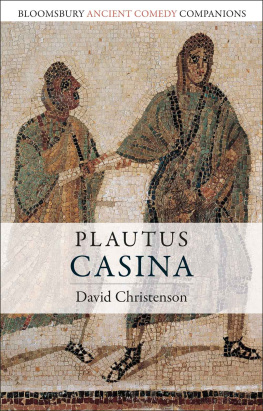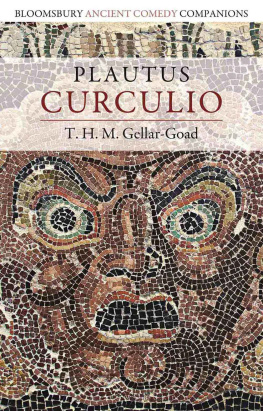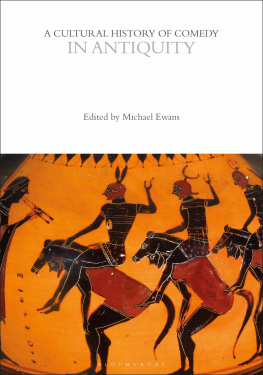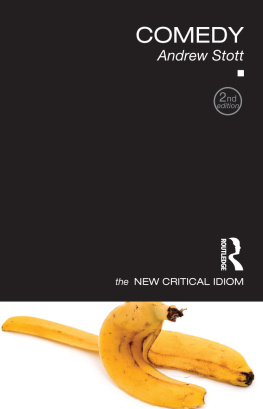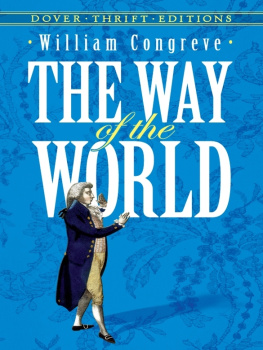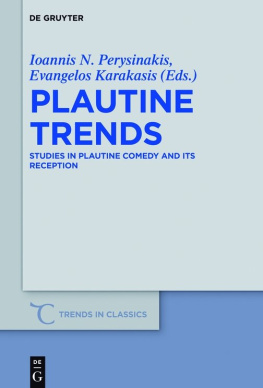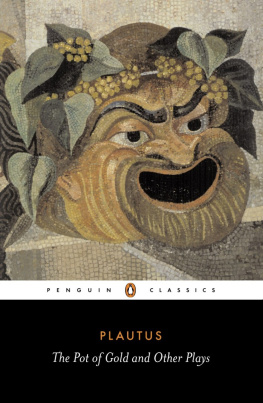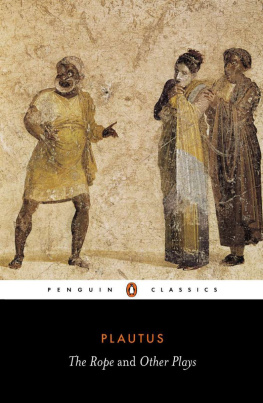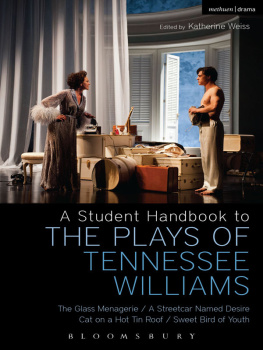
Plautus: Casina
BLOOMSBURY ANCIENT COMEDY COMPANIONS
Series editors: C. W. Marshall & Niall W. Slater
The Bloomsbury Ancient Comedy Companions present accessible introductions to the surviving comedies from Greece and Rome. Each volume provides an overview of the plays themes, and situates it in its historical and literary contexts, recognizing that each play was intended in the first instance for performance. Volumes will be helpful for students and scholars, providing an overview of previous scholarship and offering new interpretations of ancient comedy.
Aristophanes: Peace, Ian C. Storey
Plautus: Casina, David Christenson
Terence: Andria, Sander M. Goldberg

To students, the best teachers
Contents
Titles and Abbreviations:
Plautuss Plays
| LATIN TITLEEN | GLISH TRANSLATION | ABBREVIATION |
| Amphitruo | Amphitryon | Am. |
| Asinaria | The Comedy of Asses | As. |
| Aulularia | The Pot of Gold | Aul. |
| Bacchides | The Two Bacchises | Bac. |
| Captiui | The Captives | Capt. |
| Casina | Casina | Cas. |
| Cistellaria | The Casket Comedy | Cist. |
| Curculio | Curculio | Cur. |
| Epidicus | Epidicus | Epid. |
| Menaechmi | Menaechmi | Men. |
| Mercator | The Merchant | Mer. |
| Miles Gloriosus | The Braggart Soldier | Mil. |
| Mostellaria | The Haunted House | Mos. |
| Persa | The Persian | Per. |
| Poenulus | The Little Carthaginian | Poen. |
| Pseudolus | Pseudolus | Ps. |
| Rudens | The Rope | Rud. |
| Stichus | Stichus | St. |
| Trinummus | Three-Dollar Day | Trin. |
| Truculentus | Truculentus | Truc. |
| Vidularia | The Traveling-Bag Tale | Vid. |
This volume is one of three that launch the Bloomsbury Ancient Comedy Companions series. This exciting new series is designed to be accessible to non-specialists who do not know Greek or Latin but wish to engage critically with ancient comedies and scholarly debates about them. This study of Plautuss Casina reflects a conviction that these plays must first be understood and analysed as performances: the third chapter (Casina in Performance) accordingly is this books most detailed and extensive. While this volume primarily serves the needs of general readers, it is my hope that specialists in Plautine comedy will find some new interpretative points of interest to them here as well.
I owe special thanks to Alice Wright, Senior Commissioning Editor at Bloomsbury, for her guidance, encouragement and extraordinary patience throughout the entire production process. Editorial Assistant Emma Payne was instrumental in providing detailed and clear assistance in preparing the typescript, and Ronnie Hanna did an indispensable job of copy-editing. Series editors Toph Marshall and Niall Slater heroically scrutinized drafts during their theatrical tour of Greece, even finding time and energy to meticulously comment on these on buses to Meteora, Galaxadi and elsewhere. Their fine insights, critical acumen, and eyes and ears for good writing improved this book enormously (though they also allowed me freedom to indulge my own judgement, for better or worse).
Finally, I have dedicated this book to the students, both undergraduate and graduate, whose fresh takes on ancient literature constantly reinvigorate for me texts such as Casina. They remind me that the true business of the university is still the exchange of ideas.
Introduction to Plautine Comedy
Plot summary of Casina
Old situations, / New complications, / Nothing portentous or polite; / Tragedy tomorrow, / Comedy tonight! So runs a section of the opening song of the 1960s musical A Funny Thing Happened on the Way to the Forum, a lively pastiche of Plautine comedies including Casina that enjoyed great success on the stage and in its film version (see pp. 11819). Just as Plautus served Roman theatregoers fresh treatments of the Greek comedies he was adapting over two millennia earlier, the modern musical, one more in a long line of Plautine spin-offs, promises its audience something new and funny. Who was this Latin playwright whose comedies continue to delight audiences?
Plautus the Latin comic playwright
The implausible-sounding moniker Titus Maccius Plautus Dick, son of Clown, the
We, like Roman scholars first starting to (re)construct their literary history in the first century BCE ,Punic War (218201 BCE ) down through the 190s and into the 180s BCE (see pp. 1923). Casina is dated securely to c. 185 BCE by Myrrhinas reference to the Roman Senates emergency ban of Bacchic worship in 186 BCE : as she reminds the fabricating Lysidamus near the plays end, There arent any Bacchants revelling now! (980).
The beginnings of drama and literature at Rome
Plautus and Italian comic traditions
Plautuss fantastical name closely associates him and his work with mostly unscripted traditions of Italian drama. The term What little we can glean from the scant evidence for performances of Atellan farce suggests a non-elite world that admitted obscene language, parody of various kinds, rustic situations and manners, slapstick and comedic banter. Extant fragments of Atellan farce show some of the same metres found in Plautine comedy, and performances seem to have included singing and dancing. We cannot determine if Plautus performed in Atellan farce, but his clan name Maccius invites comparison of his plays with the improvisatory style of Atellan farce.
clever slave (seruus callidus) along with frequent representation of the demimonde of pimps, prostitutes, parasites et al., in which this trickster operates.
The reception of Greek comic theatre in Rome
Greek New Comedy, which flourished in Athens c. 325250 BCE and today is represented primarily by the extant works of Menander, was cosmopolitan in its plots and
Early Roman comic playwrights made Greek New Comedy the foundation of their own version of the genre, the fabula palliata or play in Greek dress. Their adaptation of Greek New Comedy to Roman stages, however, was anything but slavish, as playwrights from the start seem to have radically restructured their Greek sources, in part due to the influence of native Italian dramatic traditions.
Athenian comedy belonged to religious and civic festivals and was funded both publicly and by the contributions of wealthy citizens. The transmission; this of course was probably already true while he was active in theatre, as dramatic scripts invariably undergo changes every time they are performed. The twenty nearly complete comedies we possess today are thus perhaps best described as Plautine.
Roman comedys performance spaces the Roman forum, the circus, temples remained temporary until the dedication of Pompeys grand stone theatre in 55 BCE . For religious, moral and political reasons, the ruling elite resisted the construction of large, permanent theatrical venues in Rome, even after these were established throughout Italy.Roman theatre. These close confines made the performance space of early Roman theatre more permeable between actors and audiences than it had been in Greek New Comedy and perhaps is one of the reasons Plautuss characters frequently speak directly to spectators. The configurations of space, seating, sight lines and acoustics of temporary Roman theatre thus created a very different theatrical experience from that of spectators in Athens monumental Theatre of Dionysus.
Next page
